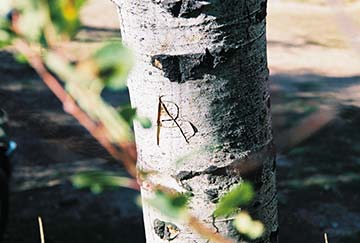
Allen J. Butters, 1918-2003
With permission from Judy, Scott, Kent and Rex, my sister and brothers, I was honored to represent them at my father’s funeral and sketch the life of Allen Butters, our dear, sweet, playful, amazing father. I’d like to enlarge my father’s circle of friends and share his life map with you — my readers.
Thirty-four years ago, when I was pregnant with my daughter Megan and living on a remote ranch in Idaho, Dad and Mom came up to help out. During the first two days of their five-day stay, Dad got busy and oiled my sewing machine, my bike, really anything that had moving metal parts, mended garden hoses, dug potatoes AND carved his name in several discreet places for me to discover later on. Mom sewed baby clothes, mopped floors, did some canning, and helped me make cheese and butter with the milk from my cow. Underneath all my busyness, I was troubled and uncertain.
Just before Dad left, he took me aside. “This place isn’t right for you. Helen hasn’t thrown her head back and laughed for five whole days.”
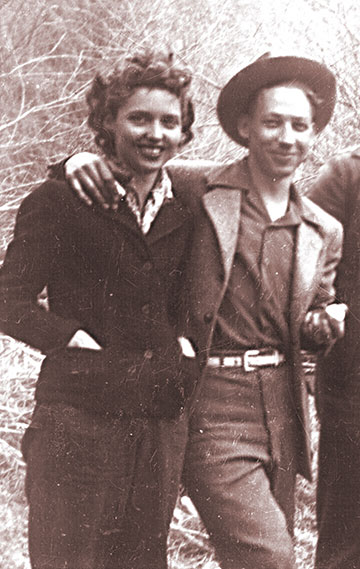
Engagement Day, Easter Sunday, 1941
Push Along
I am so proud to lay claim to a father who sought laughter—the toss your head back, laugh with abandon, surprise variety. His formula was simple. He didn’t watch funny movies. He didn’t need booze to let loose. He wasn’t a comedian, although he loved a good joke. His laughter came piggyback. If he could get us to laugh, then he laughed. He was the Bob Hope of our lives—replacing hopelessness with play and laughter.
The latest in adult self-help books promote recalling, knowing and honoring your inner child. Sticking with strict adulthood just isn’t healthy, and Dad lived the concept like a casebook illustration. That’s not to say Dad didn’t stand like a man when it came to providing for his family and his neighbors.
When he asked Mom to marry him, they got dreamy about their future together, as lovers will. On that day, he made her a promise that he kept with absolute, unrelenting resolve. Since they couldn’t afford a farm that would allow them to work together, he would work an outside job and she would be free to create, full-time, a home, no matter how hard it got. Dad gave us something precious, a mother at home. During summers, Dad left early each morning for his factory job. In contrast, we awoke every day to a fresh bowl of fruit, a breakfast prepared from scratch, handmade clothes and the day’s wholesome activities mapped out. In this he was selfless. On our fridge he posted his commitment: “The best thing you can give your children is to love their mother.” For the 40 years my parents raised children, they celebrated their anniversaries alone in our living room. They’d drape a card table with a cloth, put us all to bed, light some candles, eat a private dinner and dance. In our living room, celebrating their marriage, my parents danced to Nat King Cole, Bing Crosby, The Ink Spots, and Frank Sinatra.
For 40 plus years, he worked a ‘sometimes toxic’ noisy factory job without complaint. For 25 years, he supplemented our family income by working nights at a full-service gas station just around the corner from his day job at the American Can Company. There, he waited on cars in a pressed uniform, filling up his customers with his can-do, will-do attitude—service with an Allen smile—his version of a “fill” station.

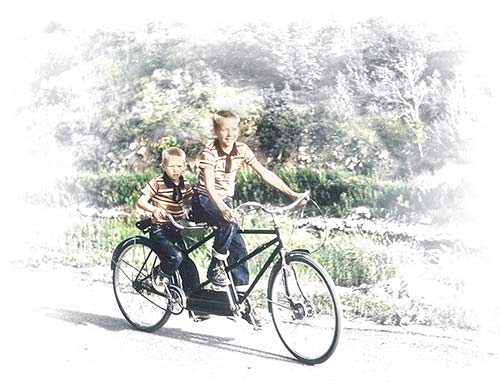
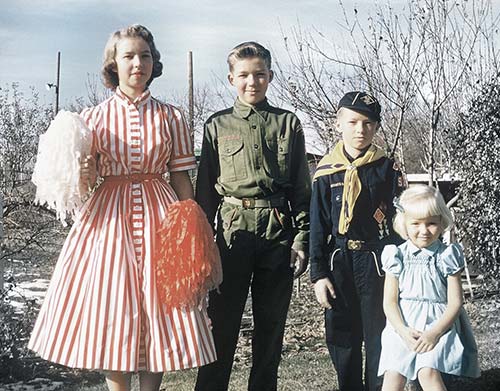
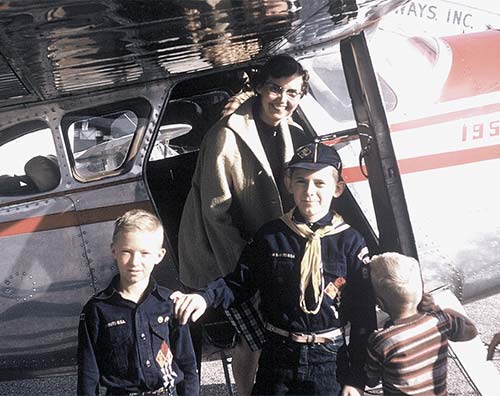
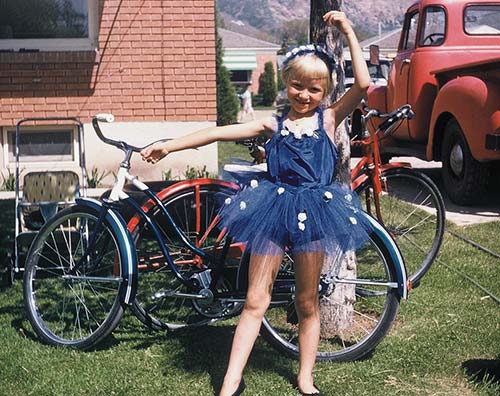
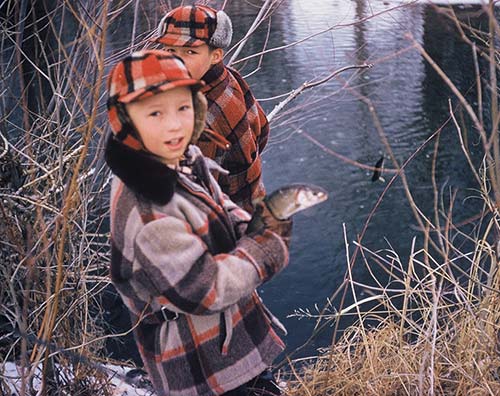
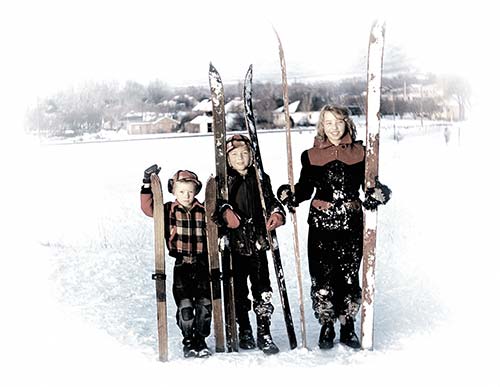
We All Have Work
Dad was known for his green thumb. Growing up, we ate the best food on earth. I am so very pleased to go off and be his “farmer daughter” and put all that he taught me to use. His passion for feeding friends and neighbors became my clarion call. I’ve added a few more zeros to the number of people I feed, but it’s our Dad in me. I tell people I love them by feeding them … again, something I learned from a pro.
During one of his visits to my Idaho farm, I got up real early—Allen style. Thinking I was first up, I headed to my hen house. There sat Dad on a kitchen chair he’d carried with him to the chicken coop, waiting for dawn to arrive—enjoying the soft cooing sounds chickens make to greet daybreak.
When Mom was pregnant with her first child, Judy, she put her newly enlisted Air Force husband on a train for Texas. Off he went, duty-bound. His sense of purpose was so intense that taking care of Mom, us kids, friends and neighbors would have been impossible without his passion for humor and play. We’ll miss his antics—the pennies behind our ears, the drops of water on our sleeping faces.

From Allen’s “Make Life Fun” Manual:
- When your children have an outdoor slumber party, run a hose beneath their sleeping bags and just before they fall asleep, hide behind the corner of the house and slowly pull it out. Having tied a black string to the handle of a bucket, run the string up and over the roof of the house and tug on it in the dark so the bucket jumps up and down. Hide around the corner of the house. Once the kids poke their heads back out of their sleeping bags, listen in on their paranormal explanation.
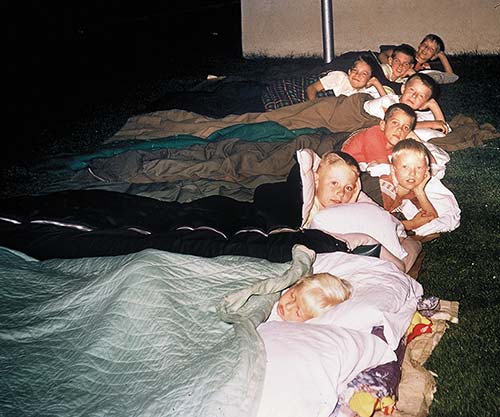
- For Halloween, get a tall ladder and put your neighbors’ bikes and lawn chairs on their roof.
- When you stop in to visit a friend and find them gone, announce your visit by leaving an ice cube tray upside down to melt on the kitchen floor. Better yet, trade out the wrapped margarine in their refrigerator for sticks of butter.
- When you visit someone like your sister who loves you a lot and find they aren’t home, but do find two loaves of fresh-baked bread sit cooling on the counter, take a knife and hollow out one of the loaves from the bottom, eat the warm insides and then put it back like you found it.
- Take your family camping most every weekend and always, without fail, find the perfect tree, first thing, and make an innertube swing. If you’re near a river, make sure it swings out and over the water.
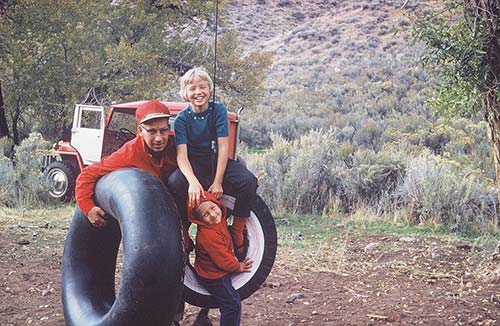
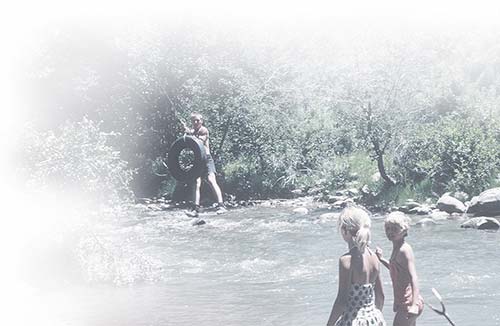
- Grow cucumbers in your garden. When they’re small, gently tuck them into a bottle. They’ll grow big inside, bigger than the mouth of the bottle. Tell all the neighbor kids you’ll pay out a dime to the first person that figures out how you pushed it inside the bottle.
- For Valentines Day, select a bunch of pretty cards for your neighbors and use the black string trick again. Once it’s dark, plant the valentine on their porch, ring the doorbell and hide behind a bush. When they bend to reach for the card, pull it away. It’ll take several tries before they yell your name.
- If you live in a house with a teenage daughter and there’s only one bathroom and you’ve asked repeatedly for relief, go to the kitchen, add some yellow food coloring to a glass of water and pour it under the bathroom door. She’ll come out directly.
- For April Fools Day, get up early and put a layer of Saran Wrap between the toilet seat and the toilet. The first bleary-eyed person heading for the bathroom is in for a surprise.
- For a Saint Patrick’s Day breakfast, add green food coloring to your morning batch of pancakes.
- To make double sure you are relating well enough to kids, spend plenty of time down low at their level. Have little chairs around. In your living room, set up kids’ games like a beanbag toss, a bottle ring game, etc. Make the games a permanent part of your decorating so it looks more like a county fair than a sitting room. Offer real pennies when they win, but have about eight gumball machines stationed nearby. That way you’ll end up getting your pennies back.
- Whenever there’s time, check out some second-hand stores and turn your backyard into a used tricycle/bicycle lot. Using oil and paint cans, wrenches and such, teach the neighborhood kids how to maintain what it is they drive. Do this way beyond the day your own kids leave home.
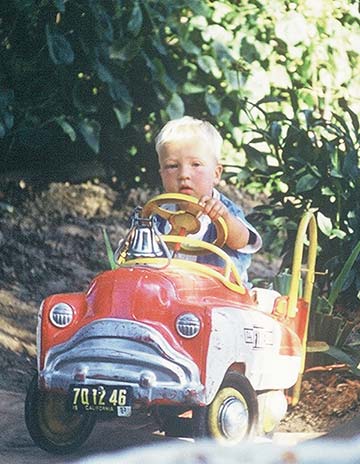
- If you have a daughter-in-law who makes the world’s best chocolate chip cookies and brings them in a Tupperware container on a camping trip, announce there are some leftovers for her to take back home. They’ll think about those cookies all the way home, get themselves unpacked, pour tall glasses of cold milk, open the lid and find … cow pies.
- Speaking of work, announce your birthday twice every year. Your co-workers won’t pay attention and you’ll double up on cake and ice cream. It’ll be years before someone catches on.

- If you’re married with two little children and you still can’t afford your own car, take your father-in-law’s Hudson for a drive whenever he’s away on business. When you bring it back to his garage, jack it up and run it in reverse to keep the mileage from showing. (Or so the story goes.) In between your renegade outings, pull your belongings and your two children around town in a Radio Flyer wagon.
Eventually, some of Dad’s grandkids finally caught on and got him back. Once, in the middle of the night, when Mom opened her bedroom door, a string of firecrackers went off. Another time, an elastic wrapped around the lever on a sink sprayer watered Dad when he turned on the faucet.
Let No One Shirk
Given the hardships my father endured in his youth, he had every right to turn out bitter … a chip-on-the-shoulder kind of guy. Not Allen. He grew up dirt poor in a family of eight. Eventually, they lost their farm in the Depression and headed to the city for factory jobs. As a young man, he walked home from school along the railroad tracks, picking up chunks of coal that fell from speeding coal-fired freight trains. The coal went home to his mother for cooking their evening meal. At night, he cut a fresh piece of cardboard for the holes in the soles of his shoes. On weekends, he laid shiny tin on the bottom of a nearby river so he could easily eye a carp, should one swim by, and nab it with a net. He sold the carp he caught for a penny a piece.
Once a week, during the dead of winter, his mother gave him one apple from their root cellar to keep him from getting scurvy. When he graduated from high school, he didn’t attend the ceremony because he was ashamed of his clothing. He didn’t own any dress clothes and wore hand-me-downs.
With a Heart Full of Song
In spite of their hardships, he and his dad, Henry Butters, learned how to tap dance, and the two of them traveled around Morgan winning tap dance contests. Decades later, when Allen was in his late 70s, our family doctor told him that at his age he should come in for a treadmill test.
Incredibly healthy his entire life, Dad showed up wearing the same tap dance shoes he owned as a young man. He hit the treadmill dancing, on and off, turning circles until his laughing doctor agreed, the treadmill test wasn’t necessary.
During prohibition, his dad, Henry, was the Sheriff of Morgan County. Behind his badge, Henry kept a little secret—he made and drank his own moonshine. Hidden under the floorboards of their barn, Allen eventually figured out what his father was up to. He and his brother, Dean, got brave one night, lifted the floorboards and drank some of Henry’s home brew. Afterwards, they left for a community dance.
Halfway through the dance, the potent illegal liquor got the better of Dean. He fell on the floor saying, “Sheriff Butters makes the best moonshine on earth.”
Allen’s mother, Artie, equaled her husband in character. Once when the men were downstairs behind a locked door playing poker, Artie lit some sulfur on fire and lowered it down the clothes chute. She ended up catching the house on fire, making good her claim to end their poker game.
Allen Butters also had every right to grow up afraid, tightfisted and miserly.
But I have never met anyone, anywhere, as generous and giving as our Dad.
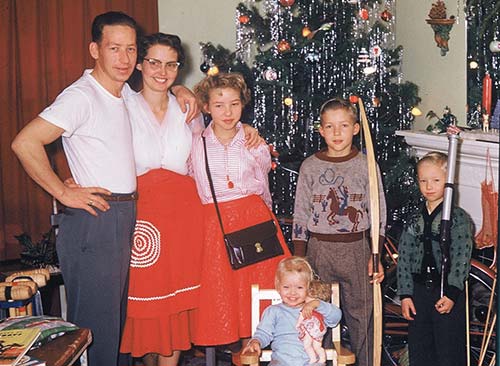
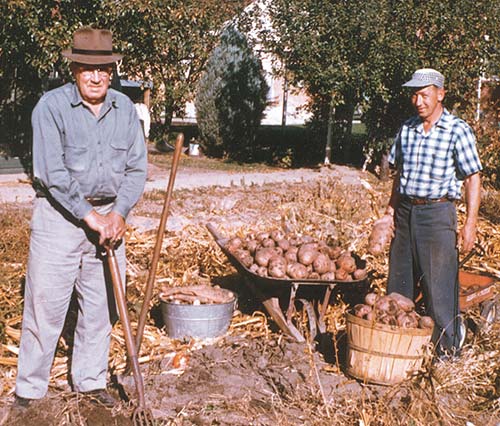
No one ever left our house empty handed. He sent people away with mind-teasing paper puzzles. Food. Garden produce. Snickers candy bars. For Halloween, he gave away piggy banks made with leftover tin from the American Can Company. Trick-or-treaters left our house with a few starter pennies jingling in cans. And ropes. Everyone who knew Dad has one of his ropes. He inherited his father’s manual rope maker, now considered a valuable antique, and with it he made probably 1,000 ropes, all in all. Toward the end, as Dad’s dementia worsened, a good samaritan neighbor visited him routinely and kept him supplied in twine, always being kind enough to act like he was seeing Dad’s rope machine for the first time.
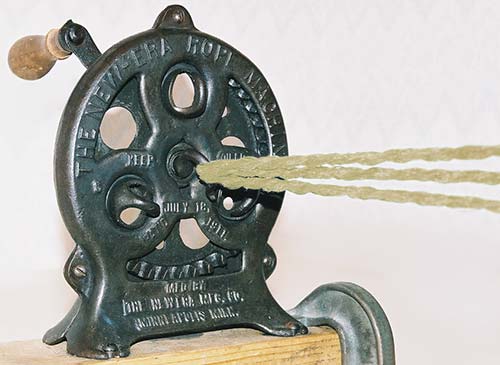
I actually grew into adulthood fantasizing that if I could just own my own truck, I could lend it out like Dad did. With a mixture of pride and generosity, he was the owner of the neighborhood truck. Our neighbor’s construction and manure needs were my Dad’s calling—kind of like “Mike Mulligan and His Steam Shovel.”
And just like Mike Mulligan, he was an inventor—way ahead of everyone else. When he encountered a problem, off he would go to his workshop to cleverly devise a solution. From my youth, I remember many of Dad’s clever gadgets and ideas, like a boot scraper with side brushes attached to our porch, a similar design now for sale in places like Wal-Mart.
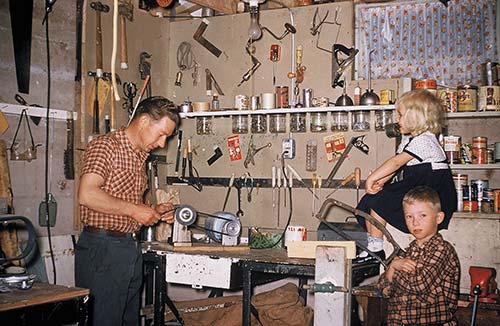
Ogden Resident Patents Invention
Salt Lake Tribune, December 20, 2002
OGDEN — Allen Butters, 84, received a United States patent for a bracket for storing cutting boards beneath kitchen cabinets. Butters is a lifelong Ogden, Utah, resident. Grandway USA, in Salt Lake City, purchased the license to produce, market and distribute the Hide-Away Cutting Board, now available nationwide at Lowe’s Hardware.
Buy Allen Butters’ Hide-away Cutting Board at MaryJanesFarm.org!
He was the quintessential recycler. I remember his flower planters made from discarded tires. And fruit pickers—during one of my training sessions with an organic farm apprentice, I showed him how to make one of Dad’s fruit pickers. He pointed out that he’d recently seen a similar device in a garden catalog.
And Dad’s dust-mulch planting method, the clever way he planted potatoes, bird feeders made with upside-down garbage can lids, his mobiles made from discarded computer discs … on and on.
Eventually, my brother, Scott, facilitated a patent on one of his many inventions—a device that holds and hides a cutting board beneath your kitchen cabinet. Filling in for Dad perfectly, Scott said, “Let’s give his cutting board invention away at the funeral.” Both my brother, Kent, and my son, Emil, piped up, “And Snickers candy bars.”
For 45 years, my father was a Mormon “home teacher.” Once a month he would visit four families. Some years he was assigned six or seven families, which meant he spent more than one night a week “calling.”
He was a person who was “called” to “call.”
I remember he always walked. And it wasn’t until our next-door neighbor, Virginia, was put into a nursing home several miles away, crippled with multiple sclerosis, that he drove. Every month, like clockwork, my father visited Virginia for 10 years, until she died.
He was assigned Mormons and non-Mormons. Maybe it was an attitude unique to my father, but as a home teacher, I know he never pushed religion on anybody. Looking back, I think on an unconscious level, it wasn’t the doctrine part of religion that motivated Dad, it was the social part—the community part of it.
Instead, he planted trees in people’s yards. His trees are big now, dozens of them up and down several streets in our neighborhood. For the older “widow ladies,” he was a handyman for plumbing projects, car repairs, sewing machine maintenance and the like.
He supervised our neighborhood cannery, keeping the machinery in tip-top shape. Two blocks away, the cannery was staffed by volunteer women and children during the ’50s and ’60s. My father created community with an oilcan! He was a great believer in oil, always visiting neighbors with an oilcan in hand. Every kid on our block had a well-oiled tricycle/bicycle and there wasn’t a squeaky door in the neighborhood. He’d be visiting with someone and without missing a beat, he’d reach up and oil a door hinge. Sometimes it dripped onto carpets and floors and the women would roll their eyes.
Dad’s knives were kept razor sharp. He always kept a sharpening stone handy. No one who knew our dad ever had a dull knife, a dull pair of scissors, or a dull lawn mower.
And he always delivered food, fresh food, baked food, sweet food. Once he developed dementia, he put a Snickers candy bar in the mailbox every day for our mailman.
He was big on games like lawn croquet and horseshoes. In our backyard, Dad engineered a permanent horseshoe-throwing pit so the men could stop and pitch a few, always a good excuse to laugh and spend time together. The last time I visited him at home, I beat him in a game of croquet. It may have been a first—he is known for winning.
We also had a ping-pong table in our basement. On that same table, we girls laid out our sewing materials and patterns for cutting. We sewed our own clothes, even men’s suits and coats and curtains. The men also used the table for cutting up deer meat every fall. Covered with tablecloths, that same table served Thanksgiving feasts over the years to dozens of relatives and neighbors. Most of Dad’s best friends lived barely a wave away.
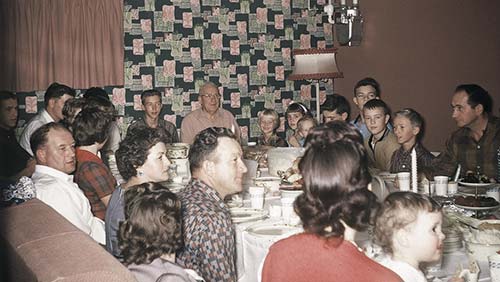
Throughout my adult life, I’ve lived in many places. Dad and Mom always came to see me. Once, it meant traveling in a small plane into Idaho’s Selway-Bitterroot Wilderness, 30 miles from any road, landing in a pasture. A week later, when the pilot came to pick them up, Dad rolled a huge cross-section of a tree (cut by hand with a cross-cut saw), down to the airstrip asking if he could get some help loading it in the plane. He wanted to take it home and use it as a souvenir table top in our backyard, which he did.
I felt like the “airstrip” was a dicey proposition at best, and I never wanted extra weight on board. If lift-off didn’t occur at just the right moment, the plane would either slam into the canyon wall or plunge 500 feet into the river. Years later, our pilot that day would die during lift-off from the Moose Creek runway.
As we were saying our goodbyes, Dad said what he always said, absolutely always, without fail: “Don’t say goodbye, that means forever. Say, ‘See you later.’”
On July 27, 2003, in a chapel full of flowers, family, friends and neighbors, we gathered together for Allen’s lift-off — to witness his approach.
It was perfect … his rudder true. He banked just right.
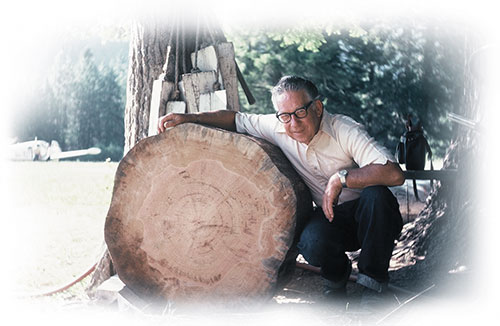





















































What a remarkable story of a special man. Thanks for sharing him with all of us!
There should be more Allens in the world today. What a lovely tribute to your dad – thank you so much for sharing.
What a lovely story! Stumbled across it while searching for your Dad’s cutting board to replace the one I left behind at my old house. What a great little invention from a great guy. Thank you for sharing and reminding me there are good people in this world.
In our busy society today, it’s hard to find someone like Allen – or really to imagine someone as dedicated to humanity as he was. You were a truly blessed family.